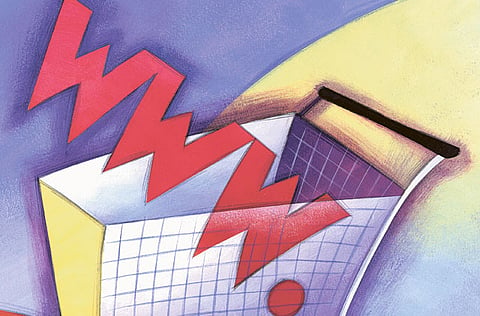UAE’s online shoppers go cross-border on their buys
For clothes and cosmetics, more such purchases are sourced from overseas portals

Dubai: When it comes to the personal, UAE’s online shoppers are thinking cross-border.
Here’s the evidence — buying of cosmetics and other beautycare products from online sites based outside of the UAE and region were up a whopping 158 per cent in the last 12 months.
When it comes to clothing and accessories, 64 per cent of cross-border online shopping transactions originating from the UAE related to those products, according to recent data brought out by the payments company PayPal. Toys also head shoppers here searching for — and buying — from overseas portals.
So, what is it that prompts a sizeable number of UAE’s online shoppers to stick with cross-border buying? Has it to do with prices only — that buying from elsewhere they don’t need to pay as much as local listed prices? Or is there a wider selection of brands they can tap into than is available with local/regional shopping sites?
Whatever be the reason, cross-broder online shopping is not going away. Which directly means that those are dirhams and dollars not getting spent with local portals.
“In the UAE, 61 per cent of online shoppers stated that they shopped online from websites in another country, which is a 33 per cent rise from the previous year,” said Efi Dahan, General Manager, Eastern Europe, Middle East and Africa at PayPal.
“And 12 per cent said that they only shop online cross-border.”
But the UAE’s portal operators needn’t lose their sleep over it. PayPal says this preference is in line with what global shoppers elsewhere tend to do.
“Cross-border online shopping is now growing at 30 per cent — which is double the rate of global e-commerce.”
There are also clear patterns in UAE shoppers’ choices of overseas portals. The US “is leading in trust and quality, [while] India is the second top destination based on logistics benefits,” said Dahan. “China, mostly, gets the bargain hunters.”
On their part, the region’s e-tailers are doing their bit to stem the flow of buying to overseas portals. Souq.com, of course, is offering access to Amazon’s “Global Store” on a range of merchandise and the promise of 48-hour delivery on some. Just before summer, noon.com formalised an alliance with eBay (PayPal’s former owner), to offer access to products “not readily available” in the region. In Saudi Arabia, wadi.com extended its reach by offering shoppers direct access to Chinese and Indian vendors.
At the time, Pratik Gupta, founder and managing director of Wadi.com, had said: “The Middle East customer is having a dearth of the same assortment of merchandise that is available globally. What we are doing is bring those supplier geographies closer to this region by creating a global marketplace. We are promising a seven-day delivery on these transactions.”
Dahan echoes the fact that local/regional portals are getting better in their product mix. This, he says, can work both ways — appeal to local shoppers and even help them to tap possible interest from buyers elsewhere.
“Having a cross-border strategy allows merchants to capture incremental sales and grow their addressable market by reaching a wider customer base in new markets at further distances,” Dahan added. This way, they “compete with global online shops and marketplaces.”
As a category, online retail sales in the UAE/Gulf continue to put in higher growth rates than in brick-and-mortar. As such, physical store sales in these market are passing through a torrid time and no one expects a turnaround any time soon.
“The percentage of e-commerce (as a portion of overall retail sales in the region) is expected to remain around 2 per cent, which shows the huge potential,” said Dahan. “This potential attracts competition, which is healthy in addressing the cash-on-delivery (issue) which is the main challenge.”
Trying to lure UAE and Gulf shoppers away from cash-on-delivery
Cash-on-delivery buying is a fact of life in the regional markets. However much they try, online portals still can’t get enough shoppers to opt for digital payment transactions.
But Efi Dahan of PayPal says those incremental improvements are being made in changing how shoppers finalise their online transactions.
“Cash-on-delivery is an incomplete purchase whereby customers haven’t yet committed to their transaction,” he said. “This customer attitude driven by concerns around safety and trust often results in high return rates, which then leads to increase in costs for online shops.
“The digital payments in the region is fragmented and so I would expect there to be room for multiple players.”
Sign up for the Daily Briefing
Get the latest news and updates straight to your inbox



